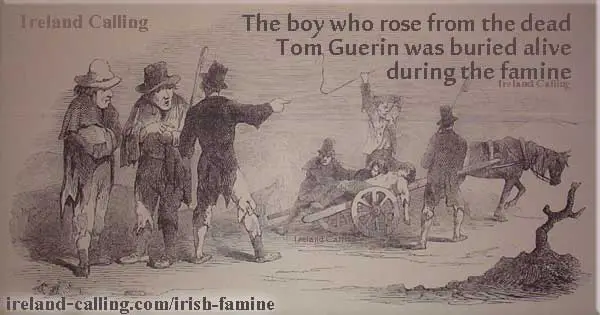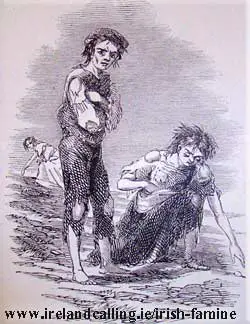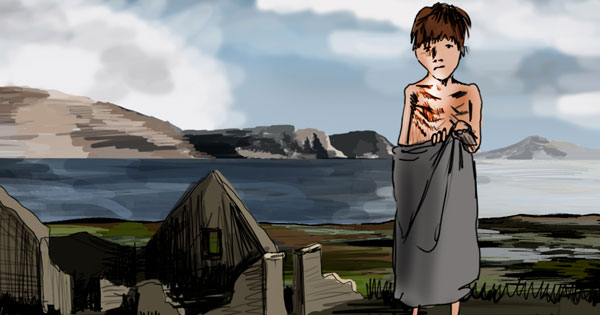One of the many lesser known consequences of the Irish famine was the loss of dignity people had to endure as they struggled to survive.
The indignity of having to beg for food and depend on welfare, of being evicted from their homes for being unable to pay the rent, and the indignity of being treated as an unwelcome burden on the state.
For many, the humiliation continued even after death. This was not a time for observing the accepted niceties of civilised behaviour. At the height of the famine, thousands were dying by the day. Those who survived had barely enough energy to carry on living, let alone give their dead a proper burial.
It meant that during the Famine in many parts of Ireland, the usual burial practices were suspended.

Respectful religious ceremonies suspended
The normal wakes and respectful religious ceremonies were set aside. The dead were buried as quickly as possible and with the minimum effort. Many were simply dumped into mass graves alongside dozens of other nameless victims.
The relatives would not be able to afford a coffin as every spare penny had to be spent on food. In some cases, they might be able borrow a reusable coffin with a hinged lid. This would allow at least some dignity during the burial process. However, once the ceremony was over, the coffin lid would be opened and the body dumped out so the coffin could be used for another victim. This process could be repeated over and over again.
During these mass burials there were reports of some people being buried alive. Such incidents happened when people collapsed due to hunger or disease. In their weakened state they could appear to be dead. Diseases were rife during the famine so burials were carried out as quickly as possible to reduce the chance of contagion. In this haste, mistakes would sometimes occur.
Tom Guerin – three years old and buried alive
One of the most famous instances involved a boy called Tom Guerin. He was only three years old when he was buried alive in a mass grave in Abbeystrewry near Skibbereen.
The details of exactly what happened are sketchy. Some reports say he was buried for two days before the mistake was discovered, possibly when more bodies were being dumped into the same pit. Others say the mistake was discovered during his burial. The gravedigger accidentally struck his legs with a spade, causing Guerin to groan. This is probably the more likely scenario but we may never know for sure.
Guerin survived but was crippled for the rest of his life because his legs were broken during the ordeal. It’s not known for certain what caused his injuries. One suggestion is that his family may have broken his legs in order to squeeze him into a makeshift coffin. Or, perhaps more likely, he might have been injured by the blows of a gravedigger’s spade.
‘The boy who rose from the dead’
Guerin grew up to be a well-known character in the West Cork area.

He scraped a living as a beggar and traded on his macabre celebrity as “the boy who rose from the dead”. Despite the trauma of his early life he had a cheerful, outgoing personality with a good sense of humour. He dabbled in writing poetry and wasn’t shy about promoting his work. He would announce himself to people by saying: “I’m the poet, I’m the genius.”
Guerin spent the summer months travelling the county begging and looking for work. He spent the winter in the local workhouse.
He retained a sort gallows humour about his experiences and could refer to his crippling injuries for comic yet poignant effect. In late 19th century Ireland, the poor could apply to the Guardians of the Workhouse for help in times of need.
Guerin – the poet
Guerin applied for a pair of boots and supported his case with this rhyme.
I rose from the dead in the year ’48,
When a grave at the Abbey had near been my fate,
Since then for subsistence I have done all my best
Though one shoe points eastwards and the other points west.
I roam o’er the world admiring each scene,
And a tax on the ratepayers I have never been,
I only appeal to you now for a pair
Of brogues, and I’ll vanish again into air.
His application was successful; he got his brogues.
Guerin died in 1910 at the age of 65, an impressive life span at that time, especially for someone who had endured such a traumatic start in life and was probably malnourished for most of his childhood.
More Famine Videos
The Irish Famine – the Great Hunger
An English View of the Irish Famine
